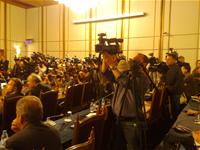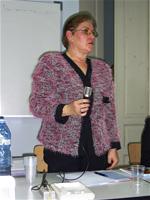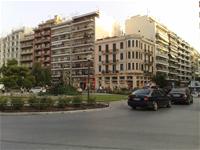Society as a function of media or vice versa
Adelina Marini, August 5, 2010
 We could judge the state of a society by its media but if we do not know local media then we could do it vice versa - you derive a conclusion about media from society. I was forced to do the latter in Greece because, for language barriers, it was hard for me to assess what do media excite their society with. However, I had help - a meeting with a professor in the School of Journalism at the Aristotle University in Thessaloniki Christos Fragkonikolopoulos. 18 Bulgarian journalists met him, although our programme included a meeting with several Greek colleagues but they, all of a sudden (a day earlier), appeared to be in a vacation. This was the lighter shock. The stronger was that the 18 Bulgarian journalists showed almost no interest in the discussion with the professor.
We could judge the state of a society by its media but if we do not know local media then we could do it vice versa - you derive a conclusion about media from society. I was forced to do the latter in Greece because, for language barriers, it was hard for me to assess what do media excite their society with. However, I had help - a meeting with a professor in the School of Journalism at the Aristotle University in Thessaloniki Christos Fragkonikolopoulos. 18 Bulgarian journalists met him, although our programme included a meeting with several Greek colleagues but they, all of a sudden (a day earlier), appeared to be in a vacation. This was the lighter shock. The stronger was that the 18 Bulgarian journalists showed almost no interest in the discussion with the professor.
In fact, a meeting with a professor in journalism is very important because it gives quite clear idea about how future journalists enter the profession, what their attitudes are in university, what their dreams are for professional realisation and, ultimately, what the result is. And because professor Christos Fragkonikolopoulos's words impressed me very much for the parallel with Bulgaria, I decided later (when back in Bulgaria) to see what the opinion of a Bulgarian professor of journalism is.
One of the first things Mr Fragkonikolopoulos said was that journalism had  significantly evolved and it was not longer important how many numbers you had in your phone book but how much you had read. Actually, this can be seen clearly in all media in Bulgaria - yes, you can have the phone number of a politician but if you have nothing to ask him, so what? This is why in the School of Journalism in the Aristotle University in Thessaloniki, professors try to make their students read, think analytically and critically.
significantly evolved and it was not longer important how many numbers you had in your phone book but how much you had read. Actually, this can be seen clearly in all media in Bulgaria - yes, you can have the phone number of a politician but if you have nothing to ask him, so what? This is why in the School of Journalism in the Aristotle University in Thessaloniki, professors try to make their students read, think analytically and critically.
The problem is that they do not want to. I was very surprised by his words that, in fact, most of the students enter University already tired. They do not want to read a lot of books and if it is possible everything to be summarised it would be best. They also expect to be taught how to write articles, how to make interviews and other things, for which professor Fragkonikolopoulos says that can be learned on the fly and it is not worth losing 4 years of high education for such knowledge.
Unfortunately however, students enter university with a mentality which is  difficult to change and even, sadly admits the professor, it does not change at all. This is why the expectations of professors are out of 85 students per year at least 5-6 to leave university being good professionals. By the way, doctor Maria Neykova from the Sofia University Faculty of Journalism agrees with this. But she explains it like this: "Yes, there is something like this. Generally when you teach, you look for those several people who could be your support. For example, you see resonance in their eyes, then you see their presence".
difficult to change and even, sadly admits the professor, it does not change at all. This is why the expectations of professors are out of 85 students per year at least 5-6 to leave university being good professionals. By the way, doctor Maria Neykova from the Sofia University Faculty of Journalism agrees with this. But she explains it like this: "Yes, there is something like this. Generally when you teach, you look for those several people who could be your support. For example, you see resonance in their eyes, then you see their presence".
 However, it will not be fair if we blame students only. After all they are victims of the system. In Greece, after graduation, young journalists usually work the first couple of years without salary and when they settle in a media, in the beginning they are very low paid. To some extent, I thought, this is good, because it motivates an individual to fight to prove its capabilities and to strive being a good professional. Nowadays, however, as doctor Neykova says, students just cannot survive if they do not work. This is the reason why many of the them work, while studying and the fact that they are not obliged to attend lectures, makes the situation even worse.
However, it will not be fair if we blame students only. After all they are victims of the system. In Greece, after graduation, young journalists usually work the first couple of years without salary and when they settle in a media, in the beginning they are very low paid. To some extent, I thought, this is good, because it motivates an individual to fight to prove its capabilities and to strive being a good professional. Nowadays, however, as doctor Neykova says, students just cannot survive if they do not work. This is the reason why many of the them work, while studying and the fact that they are not obliged to attend lectures, makes the situation even worse.
And not only this - especially in Bulgaria a great part of students find themselves, studying journalism accidentally, because of the system, doctor Neykova thinks. For example, because of the exam in Bulgarian Language and Literature, necessary to become a student, many of the students get into the Faculty of Journalism just because they did not succeed with the exam to study what they wanted. Journalism could have been their 5th or 6th wish. But after the exam has been removed, according to Maria Neykova, a lot more highly motivated students appeared.
This "deformity" of the access to high education here is supported by another defect of high school education - because of the structure of teaching and the subjects being taught, students expect to receive some complete form of knowledge. But, in fact, high education gives directions for thinking, it gives an individual opportunity to learn how to find the needed information, gives tools with which this information to be analysed. It is not from here to here and over, I already have high education and I don't need to read or learn anything more, the professor on Balkans in the Contemporary International Relations tells me.
And another point on which professor Fragkonikolopoulos and Maria Neykova agree entirely - media environment is totally destructive. "I think that a great part of employers in media have found a very convenient way to appoint young people. I don't want to claim that this is convenient because they can deliberately manipulate, but this is a vivid dependence - they can easily be laid off. Often students are been appointed not on a contract but under a different form of employment. And this is, in fact, the big problem, because we can educate our students perfectly 100% but then they end up with an employer who has specific conditions, requirements, political or economic commitments. We have been unable to tackle this problem for 20 years already. There is one more thing, which is extremely important for journalism - this is a profession that does not require a specific educational status. It is, like I've compared it long ago, just like that of a member of parliament - everyone can become an MP and everybody can become a journalist".
Like a paradox sound to me the words of Christos Fragkonikolopoulos: "I do not  have a high opinion about journalism - it is dirty, yellow". His further words take me back to the beginning of this article - about society and its media, because he says that the political system in Greece is a very clientelist one. There are basically two political parties in the country with a strongly centralised power. "Greek mentality makes them [citizens] think that they are a great nation, which all great and not so great powers (Bulgaria) want to eat it".
have a high opinion about journalism - it is dirty, yellow". His further words take me back to the beginning of this article - about society and its media, because he says that the political system in Greece is a very clientelist one. There are basically two political parties in the country with a strongly centralised power. "Greek mentality makes them [citizens] think that they are a great nation, which all great and not so great powers (Bulgaria) want to eat it".
Although for a long time in Bulgaria we have not had a two-party political system, this does not prevent parallels from being less disturbing - about the strong centralisation of power and the search of horns, instead of solving current problems. According to Christos Fragkonikolopoulos, Greece has achieved a lot for the past 200 years but mentality rules a constant return to ancient and Byzantine times. Of course, this is put in the context of selection what is important for media, because "journalists do not offer vision, we don't get enough information about what is going on around the world. There are mainly "national" issues about the bad Turks, the bad Macedonians, etc".
 Therefore, it is in a way logical for the Greek professor to mention an even more striking example of parallels with the Bulgarian media environment - the creation of media stars. A striking example because it is the "stars" that turn into those authorities (with all the reservations to this word), who form public opinion. For people (consumers of media content) the famous people from the TV screen or the radio are those whom they can trust. Since they have come to the stage they are famous, because we can constantly watch them on TV or listen on the radio, this means we can rely on them.
Therefore, it is in a way logical for the Greek professor to mention an even more striking example of parallels with the Bulgarian media environment - the creation of media stars. A striking example because it is the "stars" that turn into those authorities (with all the reservations to this word), who form public opinion. For people (consumers of media content) the famous people from the TV screen or the radio are those whom they can trust. Since they have come to the stage they are famous, because we can constantly watch them on TV or listen on the radio, this means we can rely on them.
For Maria Neykova the problem has two sides - "media create some stars in very big quotation marks, but media also create public stars - also one and the same. Media, I think, are very much worth reproaching because of putting labels - once they decide someone is the biggest whatever and once that individual is used, he starts being multiplied. This is a kind of an intellectual laziness, a kind of lack of criticism. The same goes for authors - we see what a limited number they are. There are other people but it's just easier - you open your phone book, you know who will pick up the phone and you call him".
And if we go back to the beginning - the students, we come to the logical conclusion - if high education can produce "100% prepared professionals", after the words of Maria Neykova, then why media do not go to the universities and recruit the best. This is a practice in each sphere in the US - companies search for their employees in universities by consulting with professors who are the best students, those with the "resonance in the eyes" (again after Maria Neykova).
Ms Neykova herself recalls, however, that even the system of high education  itself is not capable of sifting out the good ones in any way. "A big defect of our high education is that even an attempt has not been made so far to find a way to assess students' individual work. This means to be able to assess an individual by what he had read, what he had done additionally to his agenda". One of the reasons for this is that it requires an enormous effort on behalf of professors. They have almost no motivation at all, given low wages, to do anything additional because it is not just to make a student read something and write an essay. This essay has to be read which requires time, personal time.
itself is not capable of sifting out the good ones in any way. "A big defect of our high education is that even an attempt has not been made so far to find a way to assess students' individual work. This means to be able to assess an individual by what he had read, what he had done additionally to his agenda". One of the reasons for this is that it requires an enormous effort on behalf of professors. They have almost no motivation at all, given low wages, to do anything additional because it is not just to make a student read something and write an essay. This essay has to be read which requires time, personal time.
How to break the vicious circle? In the short-term it is hard to find a solution because no matter how you will teach future journalists (which fully applies to engineers, architects, doctors as well), they will have to work in an environment which for 20 years showed that either it does not want to or cannot reform towards a stage, at which it will start appreciating quality. And this gets me back to my thoughts that, in fact, the key is education (from its very beginning to its open end).